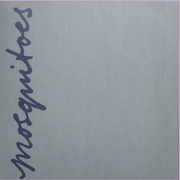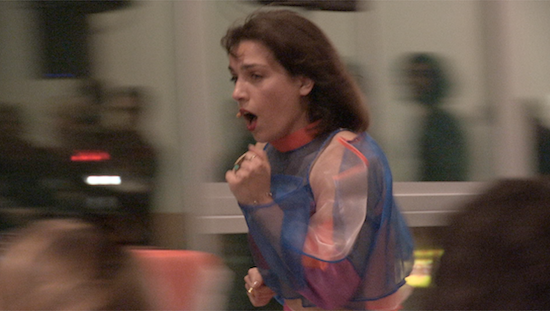Nour Mobarak performing taken from artist’s website
I took on the Rum Music mantle half way through this year. Up until June I was mostly listening to Pharoah Sanders’ Pharoah on loop while finishing a PhD about foghorns. By July I was back in the saddle, and I took up this column, then joined the team at Late Junction, and also got back in the freelance writing game. This means that my year of listening has been neatly split down the middle: I spent half with old loves on repeat, the other was an orgy of new releases. It was invigorating, and my top ten is a list of what struck me and then stuck.
A string of people have come up and come through in the last six months, and I had this thrilling reoccurring feeling when sifting through new releases, that I just could not wait to hear the next thing from this person, or that label, or that collective. There really is a lot of amazing stuff coming out, if you can reach it through the noise.
Klein hit a career peak with Lifetime IMO; Nour Mobarak dropped two releases that were totally different and made me fizz with excitement; Christobel Riley and Seymour Wright’s new duo sent me wild with hallucinatory amplifications (their only online existence thus far is limited to some vague Instagram videos). Viridian Ensemble and Dali De Saint Paul are at the start of something special.
On the flip side, the resurrection section seemed to max out its quota this year. The market for reissues seems out of control, particularly in experimental music where there is infinite curiosity for fringe sounds to be resuscitated. I’m partly to blame for this as I started reissuing records in 2013, but in the interim this practice has grown to consume all else, and I’m starting to feel squeamish when I stare at ahistorical ‘new’ releases lists.
I’m not entirely against it – I can afford things I thought I’d never hear outside YouTube – this year we were gifted affordable versions of Yoshi Wada, Robert Ashley, Eliane Radigue, Pauline Oliveros, and Louis Moholo’s Octet, as well as professional-grade bootlegs of the mind-bending collaborations between Annette Peacock and Paul Bley, to name just a handful. But is this year peak oil for that stuff? It does feel that the last great reissues are emerging, like perfectly preserved prehistoric beasts revealed by melting perma-ice. I worry these essential reissues are happening at the expense of the broader landscape for current and new sounds. Are we heading for a crisis? Or are we already there?
It’s hard to tell, because those in the edgelands have always been one chunk of funding, one paycheck, one venue or one administrative angel away from cultural death in the UK, except when the temporary blessings of independent wealth or corporate sponsorship fancy picking up a trophy for a while. This also means that it doesn’t take much to keep it going, in the scale of things, and the most important resource is love and energy. But when budgets are cut, music that might fall under the remit of this column is often the first to go, because the people with the scissors rarely know or understand it. It does not stand up well to metrics, and is often perceived to have tiny audiences with little cultural relevance beyond its own obscure hovels. All the ways in which this is wrong is an essay for another time, but in light of cuts, reductions, and difficulties, I’ve been trying to think more carefully about the ways in which I put things back into a scene. It no longer seems appropriate to just take things out by being a consumer of these many aural pleasures. The continued existence of The Zone cannot be presumed.
10. WaqWaq Kingdom – Essaka Hoisa
(Phantom Limb)
Fact: Kiki Hitomi, best known as one member of King Midas Sound, is an unsung hero. She has been making music for decades, and can lift everything with the brittle sugar of her voice, which is always instantly recognisable. WaqWaq Kingdom is Hitomi and DJ Scotch Egg, aka Shige Ishihara, and they call their style “minyo footwork”. Minyo is a form of Japanese folk music, but this pulls heavily from shangaan, along with a herd of traditional drum sounds that Ishihara joyfully lassoes into galloping heaters. Pingy, trebly, crunchy and totally euphorically banging, it’s he best kind of borrowing because it makes something brand new.
9. Nour Mobarak – Father Fugue
(Recital)
Nour Mobarak popped onto the scene with two completely different releases this year, a 7” of charmingly untamed DIY synth pop on Dylan Nyoukis’s Ultra Eczema, and a full length on Sean McCann’s Recital. The latter, Father Fugue was a jaw dropper. One side is improvised song, the other is a two channel polyglot epic, that used layered spoken word and conversations with her father, who can speak multiple language but only has a 30 second memory. It is one of the most compelling slabs of thinking-in-sound I’ve heard in a very long time, realised with economic means for maximum effect. This is what I live for.
8. CC Hennix – The Deontic Miracle: Selections from 100 Models of Hegikan Roku
(Blank Forms)
Truly, nothing makes me happier than lots of really long but slightly different notes, played for ages and ages. I should write a sister column to Rum Music that is only drone-like entities. This year was stellar for those sounds – Yoshi Wada, multiple Radigues, O’Rourke’s Steamroom outings, Winfried Muhlum-Pyrapheros, and all that Sunn O))) for the big swells. This, from CC Hennix, was really special. It is a release from the past, an early microtonal work on the flawless Blank Forms (who also had a killer year). At this point Hennix was doing a Theatre Of Eternal Music type turn, but apparently ended up ditching most of her large ensemble of string players because nobody could play a microtone. I said: “Mary Douglas said dirt was matter out of place and my mind is full of thoughts that should not be there, but composition like this loosens that unwanted grime, rinses it out with cool water. I would say it’s like a bath, but it’s more than that, it’s more like slipping your entire being into the silky green waters of a deep Swedish lake.”
7. Mosquitoes – Vortex Veering Back To Venus
(Feeding Tube)

When this came out I accurately stated that London trio Mosquitoes were the next point in the lineage of British post punk that we’ve been waiting 20 years for. It’s got it’s own unique sort of presence, and I listen when I want to hear something sonically interesting, but which doesn’t sound smug. There is something about this that I struggle to get a good grasp of – I just can’t seem to hold it in my hand and understand it – and it’s this that I think makes Mosquitoes so compelling.
To call it loose is to imply it could and should be tighter. To call it fragmentary implies that there’s stuff missing, and there definitely isn’t. It’s fully baked, with effects that render room acoustics like a corrugated metal shed, repeating basslines eddying behind serrated guitar, some talking-in-your-sleep vocals that are straight out of Deptford circa 1980, along with a smattering of rim shots, sludgy fuzz, echoes and a whole lotta hiss, crackle and pops of mysterious origin. I’m still annoyed I didn’t get the earlier ones when I had the chance.
6. Kumio Kurachi – Sound of Turning Earth
(Bison Records)
Abby Thomas’s Bison records only just got started in the scale of things, but I am excited to see it grow bigger because every release so far has been top notch. I thought I knew loads about Japanese music but Bison’s release of Kumio Kurachi revealed a gaping hole in the English-speaking data cumulus of music. Kurachi has released 11 albums and unknown quantities of cassettes, compilations and split releases, but this was his debut outside of Japan. His vignettes of life told in out-folk songs are about things like “the joy of choosing a lipstick in springtime, the business of changing the tatami, raindrops deciding whether to fall as snow”. It’s charming, but not sweet; fierce, but not bitter.
NB: The CD includes translations of his lyrics, which presents a solid imperative to drop the extra coin on the physical.
5. Haino/O’Rourke/Ambarchi – In The Past Only Geniuses Were Capable Of Staging The Perfect Crime (Also Known As A Revolution) Today Anybody Can Accomplish Their Aims With The Push Of The Button
(Black Truffle)
I should be in possession of enough assemblages featuring Keiji Haino, Jim O’Rourke, or Oren Ambrachi by now, the promiscuous collaborators they all are. Problem is when they’re together as a trio they do their best work. The song titles here read like they’re trolling a sub editor, even by Haino’s standards, which just makes it even better in my book. (Side note: Is there a feedback loop between spoof Haino and real Haino song titles?)
It’s moody and loose, and at times properly prowls, snarling and circling, tearing off your ears off in a clawing attack and walking right out the door with them dangling bloody from its mouth. I said that I was convinced the low end that opens ‘Head-on collision If it still has bones it shall move forward (which is different to progress)’ could be classed as a weather front if played on the right sound system. This remains unconfirmed.
4. Viridian Ensemble – A Cephalopod
(TBC Editions)
I was so hyped by this when I first heard it, it just works. The intensity and sense of collective timing sets up this slab of underground sound that really snagged me. It really is the territory of Noel over at the New Weird Britain column (who put vocalist Dali De Saint Paul’s duo Harrga at the top spot) but I couldn’t leave it out of my end of year column as I’ve listened to it so much.
Viridian Ensemble are an all female collective who use image, 16mm film, voice, cello, double bass, percussion and flute – I suspect it could be anything they fancied on the day. The pieces reference the Trotula Texts – some hugely influential medieval texts on women’s medicine, and this release is a recording of their performance at Bristol’s legendary underground venue and studios, The Brunswick Club, which was also where they started. RIP to that place, which was one of 2019’s great losses and will be sorely missed.
3. Klein – Lifetime
(ijn inc)
Klein has hit a career peak with Lifetime, released in September. She collages sound like it’s torn paper, all rough edges and imperfections, but manages to say something in those loose conjunctions, about the Black British experience, about family, about intimacy. There is a marching band sample, incessant harmonica, and intensely personal recorded conversations that feel voyeuristic for the listener. I always loved Klein’s readiness to let structures collapse, to worry fragments and respond. The pace and texture is a sort of insistent prodding of sound and speech unlike anything else knocking around at the moment. Her stuff has always been right at the edges of wherever it was, and I am excited and ready to hear what comes next. Listen to this in order, it’s a powerful and forceful piece of sound art.
2. Bill Orcutt – Odds Against Tomorrow
(Palilalia)
The title track from this Orcutt was the most knife sharp dagger of emotionally affecting music I heard all year, and is in my opinion the best Bill Orcutt track ever recorded. Listening to him twanging those strings is like being smacked in the face with a tin plate loaded with meat from a carvery serving up nothing but manly emotions. Orcutt’s guitar sound is lustrous and fierce, and here it radiates a prickly heat, with his signature feral blues and pranged out lullabies. It was and is the title track that really made me blubber, with a motif that makes my subconscious rise and throb in recognition, but after many months, I still can’t put my finger on it.
1. Tunes of Negation – Reach The Endless Sea
(Cosmo Rhythmatic)
This suite of psychedelic gnostic bass and rhythm productions just looped in my headphones for months. I adore Shackleton, and I am officially appointed as spiritual advisor to queen Heather Leigh, and when I first heard they were working together it seemed so unlikely and so totally perfect. It came out better than I could have hoped, Shackleton’s treatment of Leigh’s vocals corralled them into hallucinatory loops of kaleidoscoping lyrics, locked into repeating patterns by the rhythms of two percussionists: Takumi Motokawa and Raphael Meinhart. When it came out, I said it was “psychedelic shackling of two greats for cosmic elevation,” and I was right. Get high.



